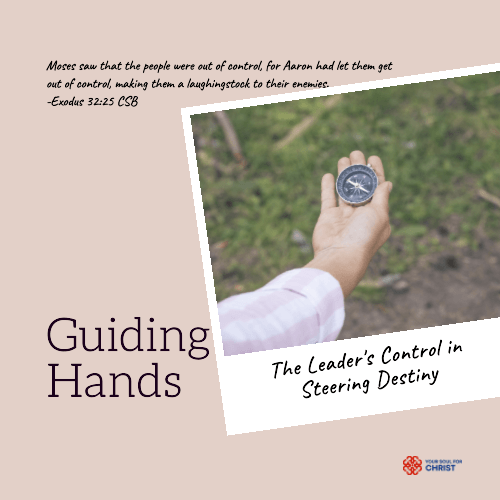Moses saw that the people were out of control, for Aaron had let them get out of control, making them a laughingstock to their enemies.
Exodus 32:25 CSB
The actions of a leader wield a profound influence, not just on their own destiny but on the fate of those they guide. We saw from verse-21 how Moses called Aaron has been responsible for the people’s sin. Leaders have power and duty. They can control their followers on what to do and how to do it. They can also help their followers grow and achieve their goals. Aaron led the people but into sin. In this post, we will look further into another area Aaron failed as a leader.
Leadership is like a fabric that connects authority and accountability. Meanwhile, a subtle but powerful force emerges—the leader’s restraining hand, a force that shapes the trajectory of a group. This force can determine what the group does and change how they do things. With a slight shift on the people, Moses noticed that they had gone out of control. Although it was not the entire congregation, as was noted in later verses. But sufficient to say that there were handful of those who had gone wield in their sin. In other words, I would say that they had become irredeemable sinners. Their death punishment testifies to this.
It is important to note that though God may hold leaders accountable for their followers, erring followers shall also receive their due punishment. The leader’s punishment would be commensurate to his failure in being a correct leader. He would not receive the punishment due any of his followers.
Now back to Aaron. We realised that the people getting out of control was because the one in control allowed them. Moses said: “Aaron had let them get out of control”. The issue was that Aaron led them into a terrible sin of idolatry. However, the inevitable caught with him – he lost his control over the people. Indeed, when a leader is caught up in sin with his followers, he loses control. How many husbands, after being caught in the act of adultery by their wives, has the audacity to exact control like before? Because Aaron led the people into sin, he made himself equal to them. He was no longer a man of standing. So, he lost his power and authority over the people.
That is what sin does to a man. Imagine if he had maintained a right standing before God, his report would have been different. Even if the people would sin, it would have been out of rebellion. A similar case is seen in Prophet Eli, indifferent to his sons’ transgressions—a man without backbone. Despite his knowledge of his sons’ transgressions, he remained apathetic.
The exchange between Eli and Samuel underscores a dangerous complacency, a sentiment akin to saying, “Let God do as He wills.” Such indifference, however, is a symptom of a heart estranged from God. Eli’s lack of concern after hearing God’s message through Samuel demonstrates a detachment from God.
Eli asked, “What did God say to you? Don’t hide it from me. God will punish you if you hide anything from the message he spoke to you.” So Samuel told Eli everything. He did not hide anything from him. Eli said, “He is the Lord. Let him do whatever he thinks is right.”
1 Samuel 3:17-18 ERV
Meanwhile, the effect of the people’s sin affected the whole congregation. They became a mere laughingstock to their enemies. These are the same people who were once an object of terror to the nations that heard of how they Lord had brought them out of Egypt. But because of the failure of the leader, they lost their place. The people of terror to the enemies became an ordinary laughingstock to the enemies.
The people, given the autonomy to choose, veered off course, becoming uncontrollable and gradually retreating from the divine presence. Their hardening hearts rendered them impervious to the voice they once revered. The fear of God, once a potent force, dissipated, leaving them vulnerable to mockery from their adversaries.
In conclusion, we must ask ourselves this important question: Are we, too, wandering from God’s presence? The narrative serves as a stark reminder that the source of strength and awe lies in our proximity to the divine. A man can only remain an object of terror to the enemies as long as he remains in the presence of God. Leaders, entrusted with the well-being of their followers, must exercise vigilance, recognizing that their decisions shape destinies. Individuals, in turn, bear the weight of their choices, impacting not only their own spiritual standing but also the collective testimony of their community.
In our pursuit of leadership or personal growth, we cannot overstate the importance of exerting influence, being accountable, and staying tethered to God’s presence. Let’s take a lesson from Moses and Aaron, making sure that we align our actions and choices with God’s will, thereby sidestepping the pitfalls of ridicule and retaining the source of our strength.
